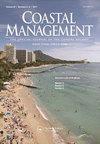Characterizing Changes in Participation and Diversification in Small-Scale Fisheries of Virginia, USA
IF 1.9
4区 环境科学与生态学
Q4 ENVIRONMENTAL SCIENCES
引用次数: 1
Abstract
Abstract Small-scale coastal fisheries are a key feature of Virginia’s cultural heritage, account for a significant portion of the state’s annual landings, and employ thousands of individuals. Despite the value of these fisheries, the number of commercial licenses sold has declined more than 15% since 1994. Using state license and permitting data, this research investigates participation and diversification in wild fisheries and marine-related economic industries through structural change and multiple correspondence (MCA) analyses. Results indicate evidence of instability in participation and diversification since the mid-1990s. The percentage of fishermen with diverse fishing portfolios accounts for less than half of those licensed and has not varied widely. Diversification into marine-related industries, however, has increased, likely due to aquaculture expansion. While some changes can be characterized as long-term trends, others indicate that participation and diversification may change considerably over shorter periods of time. MCA indicates evidence of similarity, in terms of license and permit holdings, between participants of several wild fisheries, including fishermen with a blue crab and finfish license or permit. Participation characteristics of individuals in marine-related business has changed since 1994 with more overlap between commercial fishing and seafood sales and processing in later years. Understanding participation and diversification patterns can aid managers in assessing impacts to individuals and fishing communities during adverse events and allow for consideration of social identity in management decisions. Furthermore, understanding and contextualizing resource dependency of commercial fishers, as well as the connectivity across species and sectors, may support the long-term goals of ecosystem-based management.美国弗吉尼亚州小规模渔业参与和多样化变化特征
小型沿海渔业是弗吉尼亚州文化遗产的一个重要特征,占该州每年登陆的很大一部分,并雇用了成千上万的个人。尽管这些渔场价值不菲,但自1994年以来,商业许可证的销售数量下降了15%以上。利用国家许可和许可数据,本研究通过结构变化和多重对应(MCA)分析调查了野生渔业和海洋相关经济产业的参与和多样化。结果表明,自20世纪90年代中期以来,参与和多样化的证据不稳定。拥有多种捕鱼组合的渔民所占比例不到持牌渔民的一半,而且变化不大。然而,可能由于水产养殖的扩大,向海洋相关产业的多样化有所增加。虽然有些变化可以被定性为长期趋势,但另一些变化则表明,参与和多样化可能在较短时间内发生很大变化。MCA表明,在许可证和许可证持有方面,几个野生渔业参与者之间存在相似的证据,包括拥有蓝蟹和鳍鱼许可证或许可证的渔民。自1994年以来,个人参与海洋相关业务的特征发生了变化,后来几年商业捕鱼与海产品销售和加工之间有了更多的重叠。了解参与和多样化模式可以帮助管理人员在不利事件期间评估对个人和渔业社区的影响,并允许在管理决策中考虑到社会认同。此外,了解和理解商业渔民的资源依赖,以及跨物种和部门的连通性,可能有助于实现基于生态系统的管理的长期目标。
本文章由计算机程序翻译,如有差异,请以英文原文为准。
求助全文
约1分钟内获得全文
求助全文
来源期刊

Coastal Management
环境科学-环境科学
CiteScore
6.00
自引率
0.00%
发文量
24
审稿时长
>36 weeks
期刊介绍:
Coastal Management is an international peer-reviewed, applied research journal dedicated to exploring the technical, applied ecological, legal, political, social, and policy issues relating to the use of coastal and ocean resources and environments on a global scale. The journal presents timely information on management tools and techniques as well as recent findings from research and analysis that bear directly on management and policy. Findings must be grounded in the current peer reviewed literature and relevant studies. Articles must contain a clear and relevant management component. Preference is given to studies of interest to an international readership, but case studies are accepted if conclusions are derived from acceptable evaluative methods, reference to comparable cases, and related to peer reviewed studies.
 求助内容:
求助内容: 应助结果提醒方式:
应助结果提醒方式:


